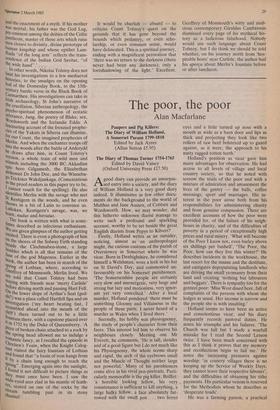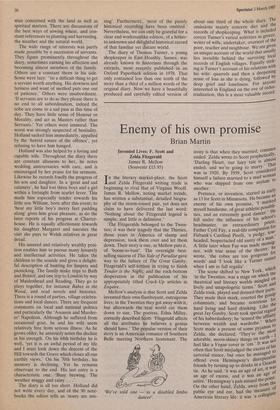The poor, the poor
Alan Macfarlane
Paupers and Pig Killers: The Diary of William Holland, A Somerset Parson 1799-1818 Edited by Jack Ayres (Allan Sutton £5.95) The Diary of Thomas Turner 1754-1765 Edited by David Vaisey (Oxford University Press £17.50)
Agood diary can provide an unsurpas- sed entry into a society, and the diary of William Holland is a very good diary indeed. It illuminates as few other docu- ments do the background to the world of Malthus and Jane Austen, of Cobbett and Wordsworth. How, we may wonder, did. this hitherto unknown diarist manage to write such a profound and sparkling account, worthy to be set beside the great English diarists from Pepys to Kilvert? Firstly, Holland writes as an outsider, noticing, almost as an anthropologist might, the curious customs of the parish of Overstowey in Somerset where he was vicar. Born in Denbighshire, he considered himself a Welshman, wore a leek in his hat on St David's Day, and commented un- favourably on his Somerset parishioners. 'The Somersetshire people are certainly very slow and unenergetic, very large and strong but lazy and motionless, very ignor- ant yet very conceited.' After a local murder, Holland pondered 'there must be something Gloomy and Villainous in the people of these parts. I never heard of a murder in Wales when I lived there.'
Secondly, his hobby was physiognomy, the study of people's character from their faces. This interest led him to observe his neighbours closely. Meeting one Mr Everett, he comments, 'He is tall, slender and of a good figure but I do not much like his Physiognomy, the whole seems sharp and rapid, the arch of the eyebrows small and the Muscle of Thought neither large nor powerful.' Many of his parishioners come alive in his vivid pen-portraits. Parti- cularly memorable is the pig killer, Briffet: 'a horrible looking fellow, his very countenance is sufficient to kill anything, a large hulky fellow, a face absolutely fur- rowed with the small pox . . . two ferret eyes and a little turned up nose with a mouth as wide as a barn door and lips as thick and projecting they look like two rollers of raw beef bolstered up to guard against, as it were, the approach to his nasty ragged rotten teeth.'
Holland's position as vicar gave him many advantages for observation. He had access to all levels of village and local country society, so that he noted with sorrow the trials of the poor and with a mixture of admiration and amusement the lives of the gentry — the balls, coffee mornings, sport and marriages. His in- terest in the poor arose both from his responsibilities for administering charity and from genuine compassion. There are excellent accounts of how the poor were provided for, of the failure of his neigh- bours in charity, and of the difficulties of poverty in a period of exceptionally high prices and rural misery. 'What will become of the Poor I know not, even barley above six shillings per bushell', 'The Poor, the Poor, how can they live this winter?' He describes incidents in the workhouse, the last resort for the insane and the destitute, and castigates depopulating landlords who are driving the small yeomanry from their land and creating 'nothing but labourers and beggars'. There is sympathy too for the genteel poor: 'Miss West dined here, full of complaints of the persons with whom she lodges as usual. Her income is narrow and the people she is with insulting.'
Holland seems to have been an active and conscientious vicar, and his diary frequently records pastoral duties. He notes his triumphs and his failures. 'The Church was full but I made a woefull mistake for I read the Second Lesson twice. I have been much concerned with this as I think it proves that my memory and recollections begin to fail me.' He notes the increasing pressures against worship: 'in country villages there is no keeping up the Service of Weekly Days, they cannot leave their respective labours', and the difficulties of obtaining his tithe , payments. His particular venom is reserved for the Methodists whom he describes as 'desperate toads'.
He was a farming parson, a practical man concerned with the land as well as spiritual matters. There are discussions of the best ways of sowing wheat, and con- stant references to planting and harvesting, the weather and the natural world. The wide range of interests was partly made possible by a succession of servants. They figure prominently throughout the diary, sometimes earning his affection and becoming almost members of the family. Others are a constant thorn in his side. Some were lazy: "tis a difficult thing to get a servant worth anything. His slowness and laziness and want of method puts one out of patience.' Others were insubordinate. 'If servants are to do as they please there is no end to all subordination, indeed the tribe are come to a sad pass at this time of day. They have little sense of Honour or Morality, and act as Masters rather than Servants.' Yet others were immoral. The worst was strongly suspected of bestiality. Holland sacked him immediately, appalled by the 'horrid nature of the offence', yet refusing to have him hanged. Holland was also helped by a loving and capable wife. Throughout the diary there are constant allusions to her, he notes wedding anniversaries with care, and is encouraged by her praise for his sermons. Likewise he records fondly the progress of his son and daughter. In a 'great and sad calamity', he had lost three boys and a girl- within a fortnight from scarlet fever. This made him especially tender towards his little son William, born after this event; to `hear my little boy's merry feet padding along' gives him great pleasure, as do the later reports of his progress at Charter- house. He is equally affectionate towards his daughter Margaret and narrates the visit she pays to Welsh relatives in great detail. His assured and relatively wealthy posi- tion enables him to pursue many leisurely and intellectual activities. He takes the children to the seaside and gives a delight- ful description of hunting for limpets and picnicking. The family make trips to Bath and Bristol, and one trip to London by way of Maidenhead and Reading. They go to plays together, for instance Babes in the Wood, and read novels and histories. There is a round of parties, village celebra- tions and local dances. There are frequent comments on local and national politics and particularly the 'Assassin and Murder- er' Napoleon. Although he suffered from occasional gout, he -and his wife seem relatively free from serious illness. As he grows older, he anxiously notes the decline in his strength. On his 64th birthday he is well, 'yet it is an awful period of my life and I must look down the descent of the Hill towards the Grave which closes all our earthly views.' On his 70th birthday, his memory is declining. Yet he remains observant to the end. His last entry is a characteristic one. 'Busy brewing. The weather muggy and rainy . The diary is all too short. Holland did not write every day, and of the 90 note- books the editor tells us 'many are mis- sing'. Furthermore, 'most of the purely historical recording have been omitted.' Nevertheless, we can only be grateful for a clear and workmanlike edition, of a hither- to unknown and delightful historical record of that familiar yet distant world. The diary of Thomas Turner, a young shopkeeper in East Hoathly, Sussex, was already known to historians through the extracts, most recently published in an Oxford Paperback edition in 1978. That only contained less than one tenth of the more than a third of a million words of the original diary. Now we have a beautifully produced and carefully edited version of about one third of the whole diary. The omissions mainly concern diet and the records of shopkeeping. What is included covers Turner's varied activities as grocer, writer of wills, undertaker, overseer of the poor, teacher and neighbour. We are given an unique account of the world that usually lies invisible behind the surviving local records of English villages. Equally strik- ing is Turner's account of his relations with his wife: quarrels and then a deepening sense of loss as she is dying, followed by deep grief and loneliness. For anyone interested in England on the eve of indus- trialisation, this is a most valuable record.















































 Previous page
Previous page